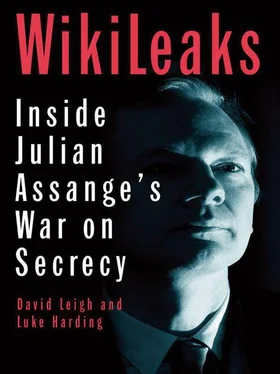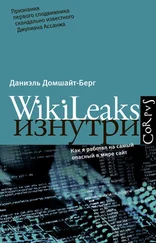Harding, Luke - WikiLeaks - Inside Julian Assange's War on Secrecy
Здесь есть возможность читать онлайн «Harding, Luke - WikiLeaks - Inside Julian Assange's War on Secrecy» весь текст электронной книги совершенно бесплатно (целиком полную версию без сокращений). В некоторых случаях можно слушать аудио, скачать через торрент в формате fb2 и присутствует краткое содержание. Жанр: Старинная литература, на английском языке. Описание произведения, (предисловие) а так же отзывы посетителей доступны на портале библиотеки ЛибКат.
- Название:WikiLeaks: Inside Julian Assange's War on Secrecy
- Автор:
- Жанр:
- Год:неизвестен
- ISBN:нет данных
- Рейтинг книги:3 / 5. Голосов: 1
-
Избранное:Добавить в избранное
- Отзывы:
-
Ваша оценка:
- 60
- 1
- 2
- 3
- 4
- 5
WikiLeaks: Inside Julian Assange's War on Secrecy: краткое содержание, описание и аннотация
Предлагаем к чтению аннотацию, описание, краткое содержание или предисловие (зависит от того, что написал сам автор книги «WikiLeaks: Inside Julian Assange's War on Secrecy»). Если вы не нашли необходимую информацию о книге — напишите в комментариях, мы постараемся отыскать её.
WikiLeaks: Inside Julian Assange's War on Secrecy — читать онлайн бесплатно полную книгу (весь текст) целиком
Ниже представлен текст книги, разбитый по страницам. Система сохранения места последней прочитанной страницы, позволяет с удобством читать онлайн бесплатно книгу «WikiLeaks: Inside Julian Assange's War on Secrecy», без необходимости каждый раз заново искать на чём Вы остановились. Поставьте закладку, и сможете в любой момент перейти на страницу, на которой закончили чтение.
Интервал:
Закладка:
The TextWrangler software took barely two minutes to throw up and itemise no fewer than 451 appearances of the word Megrahi in US dispatches. Taken together, the picture they painted was certainly different from the one officially fed to the British public at the time. The first cable up on the screen was from Richard LeBaron, the charge d’affaires in London, dated 24 October 2008. Marked “PRIORITY” for both the secretary of state in Washington and also the department of justice, the cable was classified “CONFIDENTIAL//NOFORN”. It began, “Convicted Pam Am 103 bomber Abdelbasset al-Megrahi has inoperable, incurable cancer, but it is not clear how long he has to live.”
A succession of cables then charted growing pressure – described as “thuggish” – heaped on the British by Libya. Viewed sidelong from a US perspective, the dilemma for their junior ally in London was clear, and even evoked some sympathy. The American public was going to be furious if the ailing Megrahi was let out too soon: many US citizens had died on the bombed plane, and Megrahi was the only Libyan who had ever received any kind of punishment for the atrocity.
On the other hand, if Megrahi was allowed to die in a Scottish prison (the fragments of the plane had fallen on a Scottish town, and Scotland had its own legal system) then Muammar Gaddafi, the megalomaniac ruler of Libya, was threatening dire commercial reprisals. The British ambassador was privately warning that UK interests could be “cut off at the knees”. It was the crucial truth no British politician wanted to come clean about in public.
The British administration in London managed to push the decision for Megrahi’s release – and the subsequent blame for it – on to the autonomous government in Scotland. The Scottish nationalist politicians complained bitterly to the US that they had got nothing out of the deal. The US diplomats recorded privately that it served the Scot Nats right for getting out of their depth. The Americans also noted their own suspicions that the Scots might have been in effect bribed with the offer of Qatari trade loans to let Megrahi out (both parties vociferously denied it) and that Tony Blair, when prime minister, might have cynically promised leniency for Megrahi in return for lucrative British oil deals. (The British equally vociferously denied that accusation.)
The cables left the British looking ineffectual: they failed to prevent Gaddafi’s son Saif from arranging an embarrassing hero’s welcome for Megrahi, although celebrations were somewhat toned down. And UK intelligence was so weak that diplomats were wringing their hands over the prospect of a public Megrahi funeral the following year – but on the basis of false information, duly passed on to the US, that he was now due to die any minute.
The cables also disclosed that the Americans spoke with forked tongues. While it was left to US domestic politicians to huff angrily about Libyan perfidy, the state department signalled that Gaddafi might be co-opted to help hunt down al-Qaida fundamentalists. And the Libyan ruler was continuing to dismantle his would-be nuclear arsenal, even if Hillary Clinton had to personally sign a grovelling letter to mollify one of his massive sulks.
This particular sulk came about, the cables revealed, when Gaddafi, who appeared at the UN accompanied everywhere by a “voluptuous blonde Ukrainian nurse”, flew into a rage at the derisive reception accorded to his lengthy general assembly speech. His pique was compounded by US refusal to let him pitch his iconic Bedouin-style tent in New York. Gaddaffi vented his ire, it transpired, by suddenly refusing to allow a “hot” shipment of highly enriched uranium be loaded on a transport plane and shipped back to Russia, as part of his nuclear-dismantling agreement. US diplomats and experts warned in terrified tones of a radioactive calamity, as the uranium container sat for a month, unguarded and in danger of heating up and cracking open.
This picture that emerged of US diplomatic dealings with Libya was thus richly textured and fascinating. It showed a superpower at work: cajoling, fixing, eavesdropping, manoeuvring and sometimes bullying. It also showed the dismayingly crazed attitudes of a foreign ruler possessing both nuclear ambitions and a lucrative reservoir of the world’s oil – a truth which his own subjects would rarely be allowed to see. And, from the point of view of a domestic British reporter, it showed how limited the options open to the UK seemed to be despite its pretensions to punch above its weight in the world.
These documents had to be treated carefully, Leigh realised. Some of the informants who described Gaddafi’s idiosyncrasies would clearly have to have their identities protected. Although the cables themselves were obviously genuine, it did not mean that the analysis and gossip reported therein were also always correct. And one had to bear in mind that the authors of these dispatches to Washington also had their own agendas. They wanted to impress. They wanted to promote their own views. Sometimes they simply wanted to demonstrate that they knew what was going on: diplomats, like journalists, were all too capable of turning a shallow lunch with a “contact” into a hot story, for career-enhancing reasons.
Nevertheless, with all these caveats, it was clear that America’s secret diplomatic dealings over Libya were immensely revelatory. They were not only newsworthy, but also important. This was a picture of the world seen through a much less scrambled prism than usual. And there were more than another 100 countries to go! Leigh was plunging once more into the database bran-tub when his landline suddenly rang, breaking into the silence of the surrounding Highland hills. It was his London colleague Nick Davies, with a bewildering message. It was one that threatened to derail the entire WikiLeaks enterprise. “Julian’s about to be arrested in Sweden!” he said “He’s being accused of rape.”
CHAPTER 12
The world’s most famous man
Sonja Braun’s flat, Stockholm
Friday 13 August 2010
“ Sonja tried a number of times to reach for a condom, but Assange stopped her by holding her arms and pinning her legs ”
BRAUN TESTIMONY, SWEDISH POLICE DOSSIER
The revelation that Julian Assange had been accused of rape came as a bombshell. In a series of frantic overseas phone calls, Leigh and Davies attempted to piece together a history of the disastrous sexual collisions that occurred in that Nordic high summer, which would eventually lead to Swedish prosecutors pursuing extradition of Assange from Britain to face questioning over allegations of sexual misconduct. No one had anticipated this.
One thing is clear: on present evidence Julian Assange is absolutely not a rapist as the term is understood by many – that is, he does not practise, nor is he accused of, the premeditated and brutal sexual violence that the word “rapist” evokes in tabloid headlines.
But during his time in London, Assange did often seem to have a restlessly predatory attitude towards women. It contrasted with his otherwise cool demeanour. Assange’s behaviour once even caused his own blonde lawyer, Jennifer Robinson from the firm of Finers Stephens Innocent, to blush brick-red. Gathered at the head of the stairs inside the Guardian building, a group of hungry reporters, with Assange and a number of his legal team, were debating plans to go out and eat. “Shall we take the lawyers with us?” a journalist asked. Assange leered at Robinson and said, “Let’s just take the pretty one.”
A WikiLeaks staffer confided later: “We’ve simply had to tell Julian he must stop making sexually inappropriate remarks.” Icelandic MP Birgitta Jónsdóttir, one of several exasperated women, said, charitably, that it was important to bear in mind the culture Assange came from. She told the online Daily Beast : “Julian is brilliant in many ways, but he doesn’t have very good social skills … and he’s a classic Aussie in the sense that he’s a bit of a male chauvinist.”
Читать дальшеИнтервал:
Закладка:
Похожие книги на «WikiLeaks: Inside Julian Assange's War on Secrecy»
Представляем Вашему вниманию похожие книги на «WikiLeaks: Inside Julian Assange's War on Secrecy» списком для выбора. Мы отобрали схожую по названию и смыслу литературу в надежде предоставить читателям больше вариантов отыскать новые, интересные, ещё непрочитанные произведения.
Обсуждение, отзывы о книге «WikiLeaks: Inside Julian Assange's War on Secrecy» и просто собственные мнения читателей. Оставьте ваши комментарии, напишите, что Вы думаете о произведении, его смысле или главных героях. Укажите что конкретно понравилось, а что нет, и почему Вы так считаете.












